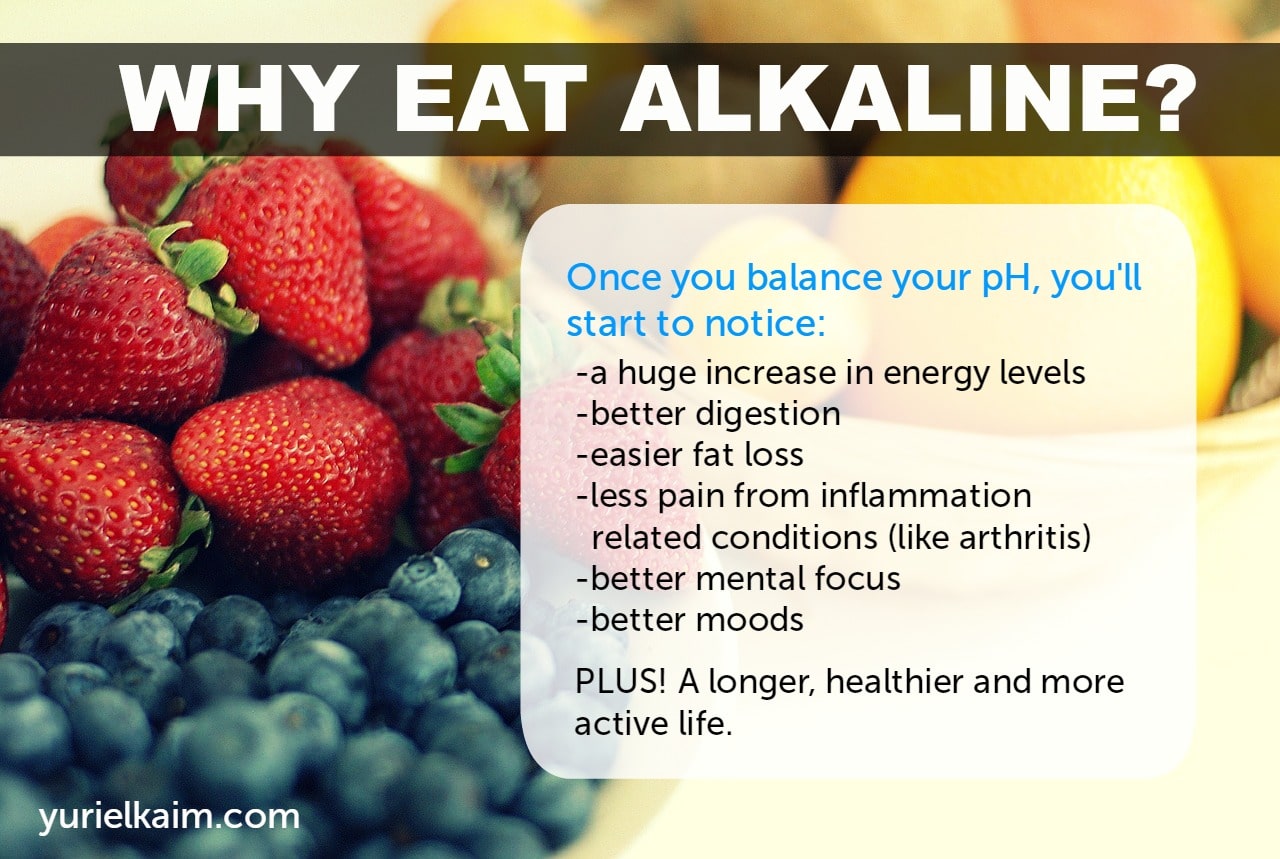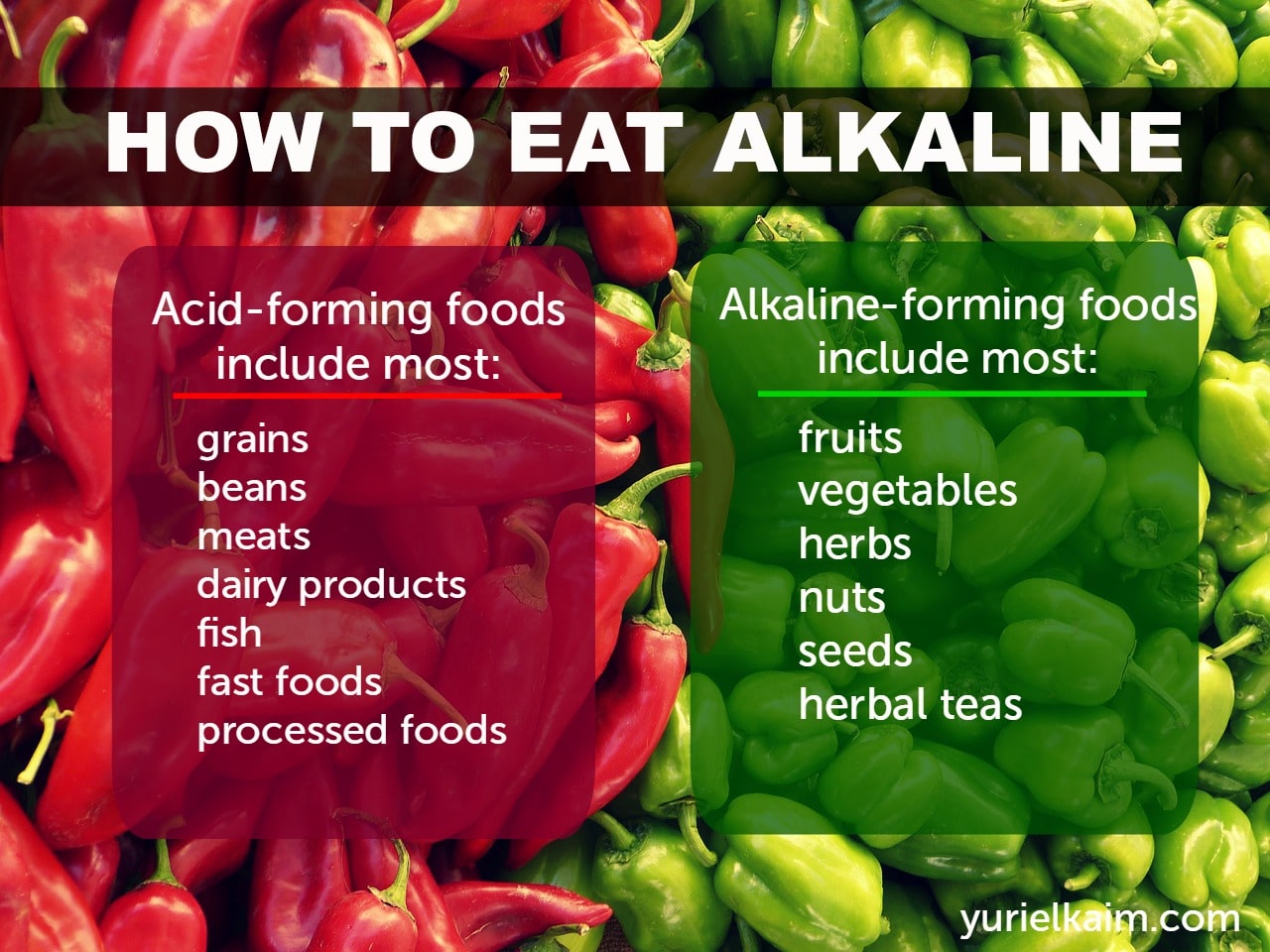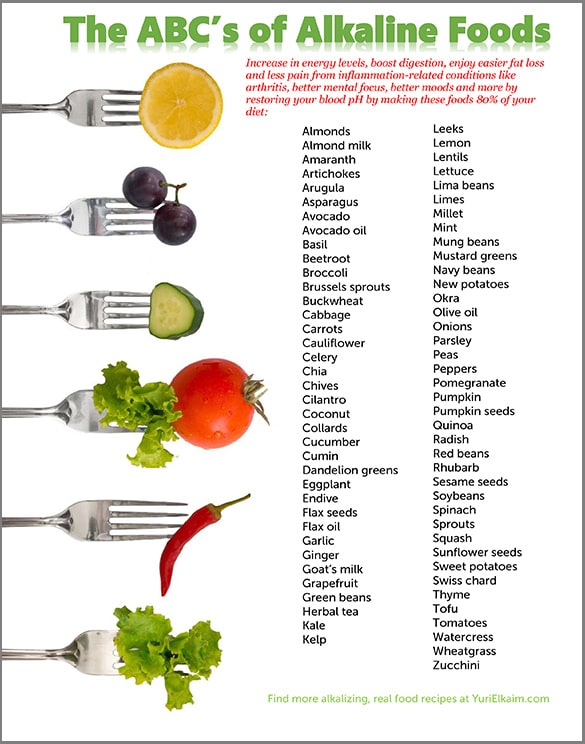With all of the diet hoopla in your newsfeed and on magazine covers every week, it’s easy to dismiss the alkaline diet as just another bunch of weight loss hype. This would be a mistake. Blood pH and alkalinity versus acidity are about survival, not weight loss.
In this article
Our bodies were designed to function at optimal health at a blood pH just above 7.0 (neutral) or just at an alkaline level (a bit higher than 7.0). Anything more acidic (lower than 7.0), by even a few points, can mean serious health consequences.
What are acid and alkaline?
Water ionizes into hydrogen (H+) ions and hydroxyl (OH) ions. When those ions are present in equal numbers, the water is t a neutral pH of 7.0. When OH ions outnumber the H+ ions, the pH goes up (as high as 14.0) and is alkaline. When H+ ions outnumber OH ions, the pH goes down (as low as 0.0) and is acidic.
How our bodies naturally arrive at their blood pH
Our bodies’ systems – mainly the blood – requires an alkaline pH in order to function properly. However, our bodies also produce a great deal of acid during every day metabolic processes (digestion, breathing, tissue repair, elimination and so on). In order to keep our blood pH in a neutral or slightly alkaline state, we need three things: water, oxygen and acid-buffering minerals.
For example, when we work out or move, our bodies produce carbon dioxide and lactic acid. Both are acidic and must be neutralized and/or removed from the body. Normally, that’s not a problem thanks to our body’s alkaline buffers like bicarbonate. However, the problem starts when you combine the acidosis produced by daily metabolism with stress and acidic foods. Over time, this can force your body to turn to precious alkaline minerals like calcium (from your bones and teeth) to maintain an optimal pH.
Other factors that influence blood pH
Aside from the body’s own processes, there are a number of other, outside things that effect blood pH.
Among these other factors, stress is a biggie. When we’re under stress, it places a greater demand on the body’s cells, making them more active and therefore producing more acid. As Dr. Theodore Baroody explains in his book, Alkalize or Die:
“Any stressor that the mind or body interprets and internalizes as too much to deal with, leaves an acid residue. Even a mild stressor can cause a partial or total acid-forming reaction,” (Alkalize or Die, Dr. Theodore A. Baroody, Jr., 1993, Eclectic Press, Waynesville, NC 28786, page 157.)
Other factors that can influence blood pH are environmental toxins, toxins and metals in food, lack of sleep and illness.
All of these things can make our blood pH too acidic. When combined with a diet high in acidic foods and low in alkaline foods, these factors can lead to disaster.
What are alkaline and acidic foods?
In a nutshell, you can divide foods into alkaline and acidic in this way:
- Alkaline-forming foods include most fruits, vegetables, herbs, nuts, seeds, and herbal teas.
- Acid-forming foods include most grains, beans, meats, dairy products, fish, fast foods, and processed foods.
If your blood pH is too acidic, you need to add more alkaline foods (a ratio of 80% alkaline to 20% acidic is a good rule of thumb). If your blood pH were too alkaline, you would eat more acidic foods, but this situation is very rare. The typical American eats far more processed foods, meats, dairy and grains than they do fresh produce.
So why is it so important?
Maintaining a blood pH of about 7.4 is essential to healthy function that out bodies have a mechanism designed specifically to maintain that level. If we become too acidic, that mechanism will protect the blood at all costs, even to the extent of compromising bone and tissue.
This mechanism will first pull acid-buffering minerals (that you’re not getting from your diet) from tissue, bone and cartilage. These minerals include calcium, potassium, magnesium, sodium, chromium, iron and selenium. That calcium is needed for bone strength. (In fact, Dr. Susan Brown, a leading researcher on osteoporosis, says in her book Better Bones, Better Body, that maintaining optimal pH is the single most important factor is improving and preserving bone density.) Both the calcium and potassium are essential to proper brain function, iron for blood and organ health and so on.
Next, this pH balancing mechanism will decrease metabolic function and even immune function in order to reduce the amount of acids these functions produce. This results in a whole spectrum of issues, such as increased free radicals, inflammation, poor digestion, fatigue, anemia and on and on.
To make matters worse, the lungs, adrenal glands and kidneys are largely responsible for maintaining blood pH via this mechanism. When they don’t have enough of the acid-buffering minerals they need, they work harder to get them, forsaking a lot of their other duties, such as hormone production and secretion, toxin filtering and etcetera.
All of these things are the reasons why it is so essential to maintain the proper level of blood pH. If for no other reason, the increase in systemic inflammation caused by acidic conditions should get you eating alkaline. Inflammation is tied to virtually every serious health condition today, including heart disease, stroke, Alzheimer’s and autoimmune disorders.
However, numerous studies have shown that even cancer can be directly linked to acid levels in the blood. One study showed that the blood pH of cancer patients averaged around 3.8, which is extremely acidic.
Here’s some additional insight on the most alkaline (and therefore best cancer-fighting foods) worth adding to your diet:
So how do I know my blood pH?
Fortunately, it’s very easy to determine and monitor your blood pH. You don’t even need to go to a doctor. You can easily and inexpensively purchase pH paper online and perform both urine and saliva tests at home.
The urine test:
- To do the urine test, you should place a few drops of urine onto a piece of the pH paper both first thing in the morning and later on in the evening. Under ideal conditions, your first morning’s urine should be about 6.4. Throughout the day, jot down everything you eat. When you test in the evening, a higher or lower pH will give you some indication of how the foods you’ve eaten throughout the day have effected your blood pH.
The saliva test:
- You should do saliva tests throughout the day; first thing upon waking, about two hours after each meal or beverage (other than water) and before you go to bed. Ideally, blood pH upon waking will be 6.8-7.2 and when testing right after a meal it should be alkaline. If not, your diet is likely an issue.
Eating an alkaline diet
Eating an alkaline diet is not difficult. As a general rule, foods that are high in either protein or refined fats, flours and sugar are acid-forming or acidic foods. This means you need to cut back on meat, cow’s milk and dairy products, wheat and most whole grains and their products. You also need to get rid of the processed foods and fast food.
Processed and fast foods are loaded with acid-forming ingredients. In fact, most of them have ALL of the most acid-forming ingredients, including refined wheat flour, refined sugar and refined fats. It’s almost impossible to avoid an acidic condition if you’re eating processed foods on a regular basis.
Once you eliminate the processed foods, try to limit acidic whole foods, such as meat and dairy, to 20% of your daily intake. Then choose alkaline or acid-buffering foods like vegetables and fruit, for the other 80% of your daily intake.
This isn’t as restrictive or boring as you might think. Just take a look at all of the delicious (and readily available) foods you can enjoy on an alkaline diet.
This isn’t one of those diets where you can’t eat anything yummy. You have a ton of fresh produce to choose from, and you can still have your steak, chicken and Greek yogurt, just in smaller proportion.
Once you start eating alkaline (and try to reduce stress, get more rest and steer clear of toxins by going organic as much as possible), you’ll very quickly be able to correct your blood pH. The difference may astonish you.
Very soon, you should see a huge increase in energy levels, better digestion, easier fat loss, less pain from inflammation-related conditions like arthritis, better mental focus, better moods and on and on. This is all in addition to restoring the blood pH that will ensure a longer, healthier and more active life.
The science-based results of alkaline eating are so life-changing, I’ve addressed some of them before.
If you haven’t read my in-depth look at the benefits of Alkaline Eating, don’t miss:
- The Alkaline Diet: 5 Controversial Truths You Need to Know About
- 19 Highly Alkaline Foods That Will Benefit Your Body
- Here Are the Top 10 Most Acidic Foods to Avoid
- Is the Alkaline Diet Key to Cancer Prevention?
The Most Delicious Way to Alkalize Your Body
Adding a daily greens drink to your diet is a quick and simple way to get more alkalizing greens into your system.




